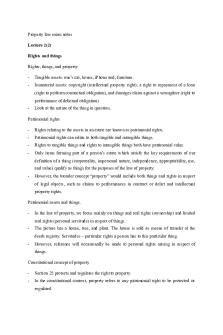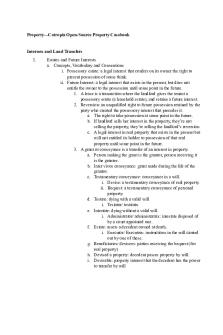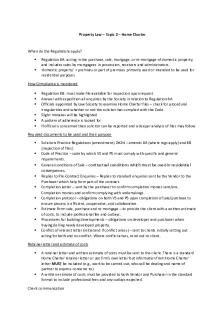Property Law – Topic 2 – Home Charter PDF

| Title | Property Law – Topic 2 – Home Charter |
|---|---|
| Course | Property Law |
| Institution | Queen's University Belfast |
| Pages | 4 |
| File Size | 113 KB |
| File Type | |
| Total Downloads | 99 |
| Total Views | 158 |
Summary
Home Charter Notes Conveyancing NI...
Description
Property Law – Topic 2 – Home Charter
When do the Regulations apply?
Regulation 8A: acting in the purchase, sale, mortgage, or re-mortgage of domestic property, and includes sales by mortgagees in possession, receivers and administrators. ‘domestic property’ = premises or part of premises primarily used or intended to be used for residential purposes
How Compliance is monitored
Regulation 8B: must make file available for inspection upon request Answer with expedition all enquiries by the Society in relation to Regulation 8A Officials appointed by Law Society to examine Home Charter files – check for procedural irregularities and whether or not the solicitor has complied with the Code. Slight mistakes will be highlighted A pattern of adherence is looked for If official is concerned then solicitor can be reported and a deeper analysis of files may follow
Required documents to be used and their purpose
Solicitors Practice Regulations (amendment) 2020 – amends 8A (where regs apply) and 8B (inspection of files) Code of Practice – code by which VS and PS must comply with specific and general requirements. General conditions of Sale – contractual conditions which must be used in residential
conveyances.
Replies to Pre-Contract Enquiries – Replies to standard enquiries sent by the Vendor to the Purchaser which help form part of the contract. Completion Letter – sent by the purchaser to confirm completion monies sent/enc. Completion monies and confirm complying with undertakings. Completion protocol – obligations on both VS and PS upon completion of sale/purchase to ensure process is efficient, cooperative, and collaborative. Estimate Form sale, purchase and re-mortgage – to provide the client with a written estimate of costs, to include professional fee and outlays. Procedures for building developments – obligations on developer and purchaser when buying/selling newly developed property. Conflict of interest letter (initial and if conflict arises) – sent to clients initially setting out acting for both and no conflict. Where conflict arises, send out to client.
Retainer letter and estimate of costs
A retainer letter and written estimate of costs must be sent to the client. There is a standard Home Charter retainer letter or use firm’s own letter but information from Home Charter letter MUST be included (e.g., work to be carried out, who will be dealing and name of partner to express concerns to). A written estimate of costs must be provided to both Vendor and Purchaser in the standard format to include professional fees and any outlays expected.
Client communication
VS: You must inform the client if any amendments are made to the draft contract by Purchaser and take instructions. You must also advise vendor when writing to the lender requesting redemption figures. Advise the vendor to make suitable arrangements for handing over possession. Advise Vendor of need to notify rates authority and if applicable ground rent agent of change of ownership and the date. Send account to Vendor. In particular, advise: a) On sending draft contract and other papers to the purchasers solicitors; b) Following final acceptance of contract and obtaining a deposit; c) Following the obtaining of redemption figures from any mortgagee; d) After completion with a statement of account. PS: where a map of property is available, provide same to purchaser. Advise of amount and need for deposit prior to submitting offer. Advise of position under any Building Standards Guarantee Scheme or any substitute. Advise in writing consequences of mortgage. On receipt of title deeds, advise of any material issues arising. Prepare and send SDLT return for their approval. Advise specifically: a) when title has been received and reviewed; b) when the mortgage instructions are received; c) when the offer to purchase is furnished to the vendor's solicitors; d) when the accepted offer or a counter offer is received and a completion date has been set; e) prior to completion, when the report on title and request for funds has been forwarded, remind the purchaser of the completion details including dealing with services.
Obligations on Client Care
in all cases respond to any request for information by the client within 3 working days from receiving same;
in all cases respond to telephone calls from the client or any professional colleague no later than the next working day;
in all cases seek to arrange appointments taking due account of any particular difficulties which the client may have and honour all such appointments save in exceptional circumstances
Property Law – Topic 2 – Solicitors duties Undertakings You must ensure that you can ‘keep your promise’ Ensure that the undertaking is within your control and you know what it is you need to do Ensure it does not conflict with any other obligation Must obtain the client’s WRITTEN AUTHORITY Mark the client’s file cover clearly to remind that an Undertaking has been given When fulfilled, obtain a written discharge from the recipient and keep on client’s file You cannot get out of an undertaking unless the recipient agrees to variation or discharge Solicitors are bound to carry out any undertaking entered into by staff If accepting an Undertaking, check whether it is qualified and if it protects clients interests and also that it can be fulfilled Conflict of Interest You cannot act for a vendor and purchaser on a transfer of land or for lessor and lessee for the grant of a lease, however… Provided no conflict arises and vendor/lessor is not a builder or developer selling or leasing, you may act if: a) Associated companies; b) Related by blood, adoption or marriage; c) Established clients and informed in writing acting for both, no conflict and cant act if one arises d) Transfer of land is less than £10,000 e) One of the parties is Co-Ownership Money Laundering All persons within the regulated sector and nominated officers have obligations under POCA and the Terrorism Act 2000 as amended, to make disclosures of suspicions of money laundering, terrorist financing and terrorist property offences. Warning signs include: a) Secretive clients; b) Unusual instructions; c) Use of client accounts; d) Suspect territory; e) Methods of funding. Checking identity of clients – seek information as to identity of client and anyone who will be in occupation of the property. If unfamiliar with Vendors solicitors, check they are registered. Check identity against documents prescribed (e.g. passport, photo driving license) and take a copy to keep on file. Also need to check address and date of birth (e.g. utility bill) If not possible to witness signature of document, it should be witnessed by two independent persons Retainer Letters Scope of work Who will be dealing with the work Complaints procedure Partner responsible AML requirements Costs Avoid legal speak Responsibility to know client understands everything
Hurlingham v Wilde case Agreement to limit solicitors duty must be clear and unambiguous Client needs to be made aware of limited reliance on solicitor That this is not a normal term and client best served going to another solicitor Always keep in writing (in retainer and in attendance notes) Estimate of costs Write to the client setting out professional fee, VAT and outlays expected Use standard form for Home Charter transactions Makes clear only an estimate Must advise client if fees are likely to be higher Sets out to client fees they may have to budget for Attendance notes Baird v Hastings No written retainer letter No attendance notes of any meetings or discussions with client Dispute over advice given and when it was given Emphasised the need to keep a record of discussions Found against the solicitor Eden v Mills Selig No written retainer letter No restrictions on scope of work Limited attendance notes General duty to pass relevant information to client Failure to provide information constituted a breach of contract BUT Plaintiff failed to show that omission caused any loss Hickland v McKeone Home Charter – must send written report on Title to client Setting out difficulties, covenants, rights or easements Not required when freehold and no other issues as above Also need to explain in person to make sure it is understood Complaints procedure
Must detail work to be carried out Who will provide the work Who to contact in firm if client concerned about the work Must give details of inhouse complaints procedure which must be in writing and can be inspected Acknowledgment within 7 days and written response within 28 days Complaint within 6 months of conclusion it within 6 months of first knowledge Complain to Law Society (if not satisfied) within 6 months of in house procedure Can use Law Society standard complaints form Inhouse written procedure must be available online or hard copy Every solicitor should be versed in the procedure to explain to clients...
Similar Free PDFs

Property Law Term 2
- 104 Pages

Intellectual Property law mcq 2
- 50 Pages

Semester 2 Property LAW Notes
- 82 Pages

Property Law
- 11 Pages

Land Law 2 Topic 9
- 11 Pages

Constitutional Law Essay Topic 2
- 3 Pages

Property Law Essay
- 8 Pages

Intellectual Property Law – Notes
- 38 Pages

Property law exam notes
- 33 Pages

Property Law - lecture notes
- 112 Pages

Property Law A notes
- 7 Pages

Property Law Outline
- 41 Pages

Property damage - criminal law
- 6 Pages
Popular Institutions
- Tinajero National High School - Annex
- Politeknik Caltex Riau
- Yokohama City University
- SGT University
- University of Al-Qadisiyah
- Divine Word College of Vigan
- Techniek College Rotterdam
- Universidade de Santiago
- Universiti Teknologi MARA Cawangan Johor Kampus Pasir Gudang
- Poltekkes Kemenkes Yogyakarta
- Baguio City National High School
- Colegio san marcos
- preparatoria uno
- Centro de Bachillerato Tecnológico Industrial y de Servicios No. 107
- Dalian Maritime University
- Quang Trung Secondary School
- Colegio Tecnológico en Informática
- Corporación Regional de Educación Superior
- Grupo CEDVA
- Dar Al Uloom University
- Centro de Estudios Preuniversitarios de la Universidad Nacional de Ingeniería
- 上智大学
- Aakash International School, Nuna Majara
- San Felipe Neri Catholic School
- Kang Chiao International School - New Taipei City
- Misamis Occidental National High School
- Institución Educativa Escuela Normal Juan Ladrilleros
- Kolehiyo ng Pantukan
- Batanes State College
- Instituto Continental
- Sekolah Menengah Kejuruan Kesehatan Kaltara (Tarakan)
- Colegio de La Inmaculada Concepcion - Cebu


